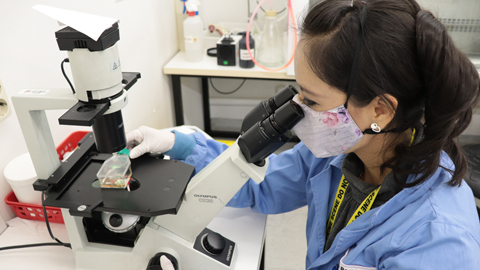Research on the impact of micro- and nanoplastics on health and the environment just a click away

The PLASTICHEAL project, coordinated by the UAB, creates a digital directory to provide an overview of research projects that study the health and environmental risks of plastic pollution and of the regulatory initiatives around the world. This is the first database focused on understanding the risks to human health.
05/05/2022
The European project PLASTICHEAL has launched an open and online directory that brings together relevant research on micro- and nanoplastics (MNPLs) worldwide.
The Plasticheal database is an attempt to gather information on all the different known projects that study the health and environmental risks of plastic pollution and compare it with the knowledge gaps that have been identified so far. This is the first open directory focused on the impact of MNPLs on human health. It has been designed to become a hub for risk assessment of MNPLs and relevant regulatory research, aimed at the public, science professionals and policy makers.
The projects currently in the database are mostly being or have been developed in Europe, although initiatives from the United States are also included and it is expected that projects from other geographic and working areas will be added as they are identified. Users can submit their contributions through the form available in the directory.
"We hope to develop a database in which we can continuously track the information that different projects are generating and to analyse what key aspects they are addressing or the degree of depth with which they are doing so", said Steffen Foss Hansen, associate professor of regulatory engineering at the Technical University of Denmark (DTU), Plasticheal partner, leader of the team in charge of database development.
Deepening the search
The built-in analytical function will allow people to search across all the different projects to know, for instance, how much funding has gone into addressing various knowledge gaps, how funding and projects have been distributed across geographical areas, or investigate different categories of research: environment, health, air pollution, etc.
"The directory is a milestone in the development of the Plasticheal framework on how to address the study of the risks associated with micro- and nanoplastics, including the results and information generated from other projects and, at the same time, addressing all key aspects without duplicating the work done", explained Alba Hernández Bonilla, project coordinator and aggregate professor at the Autonomous University of Barcelona (UAB).
About PLASTICHEAL
The EU funded PLASTICHEAL project (grant agreement No. 965196) aims at providing new methodologies and evidence to regulators by combining the use of breakthrough research and reliable test methods to set the knowledge basis for adequate risk assessment of MNPLs.
PASTICHEAL, which has received 6 million euros of from the European Commission, has the participation of 11 universities and research centres from 7 EU countries: the Autonomous University of Barcelona (UAB, coordinator), the Germans Trias i Pujol Research Institute (IGTP, as a third part linked to UAB) and the Plastics Technology Centre (AIMPLAS) and the Foundation for Health Training and Research of the Region of Murcia (from Spain), the Wageningen University (The Netherlands), the Finnish Institute of Occupational Health (from Finland), Technical University of Denmark (from Denmark), the French Alternative Energies and Atomic Energy Commission and the National Institute of Health and Medical Research (from France), the University of Manchester (from the United Kingdom) and the Helmholtz Centre for Environmental Research and the Leipzig University (from Germany).
Link to the PLASTICHEAL database: https://www.plasticheal.dk/